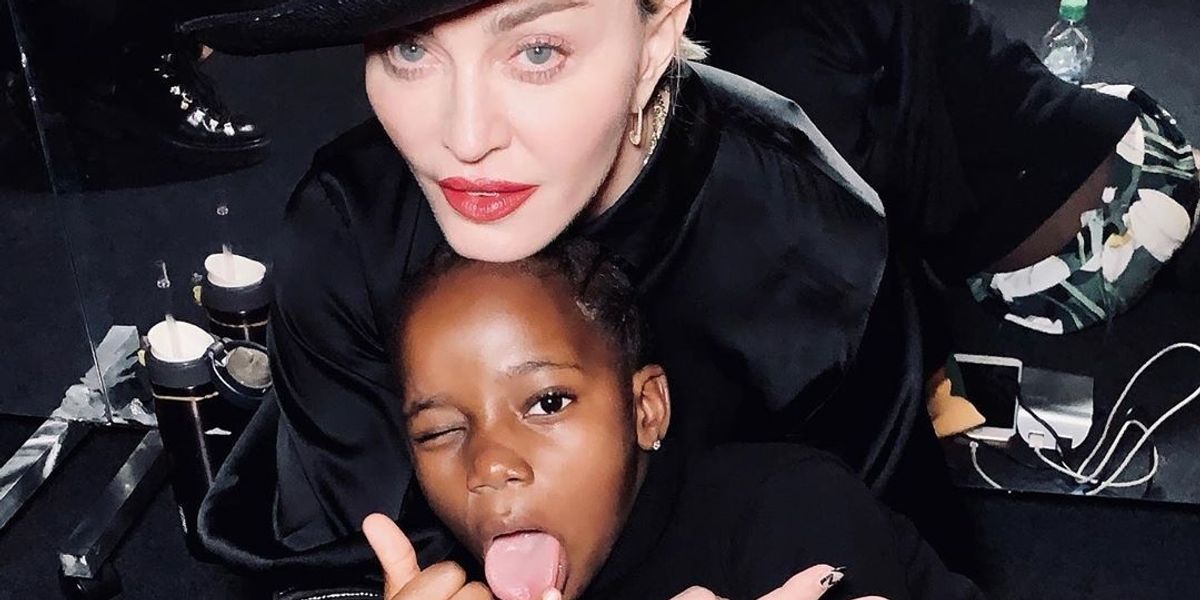
Over the weekend, Azealia Banks leapt in the comments of an Instagram post by Madonna which featured two of her Black adopted children dancing. The target of Banks' ire? A perceived lack of knowledge on how Madonna should appropriately maintain the health of her Black daughter's hair.
Banks, in her characteristically no-holds-barred style, wrote, "Omg please nuture [sic] their hair !!! This is an important time for character development. Don't masculinize them and make them have boy hair styles because you're too lazy to have any original thoughts about your children's hair. Don't adopt black girls just to post them on Instagram, actually show a real care for these future black women and make their hair as nice as the kitchen Tf."
She continues: "And Madonna has too much money for there not to be even a DROP of castor oil on these girls heads before she decided to post her refugee children dancing in her fancy kitchen to show how cultured she is as a rich top 1% white celebrity."
Predictably, these comments, which now appear to have been deleted, drew polarized responses from fans. Some argued that Banks was overstepping a line by telling Madonna how to raise her child, while others agreed with her sentiments. (So far, Madonna has not replied to Banks' messages.)
Whether Madonna is guilty of what Banks is accusing her of or not, this exchange does seem to be on-trend with more high-profile white celebrities publicly proclaiming their willingness to educate themselves on the ins and outs of Black hair. (To be clear, we are not accusing Madonna of neglecting the hair needs of her adopted Black children.) Kylie Jenner recently posted a time-lapse video of herself styling baby Stormi's hair, with the caption: "I love doing her hair. I'm not the best but I love learning. Some of my favourite memories are of my mom doing my hair."
Serena Williams' husband Alexis Ohanian Sr., revealed that he reached out to private natural hair groups online to learn how to do daughter Alexis Olympia's hair, tweeting, "Just applied to join 4 private Natural Hair Facebook groups. I hope they don't auto-reject my application when they see my profile photo. I told them it was to keep getting better at doing my daughter's hair."
These are all important first steps toward proper education, but some hair experts, such as London-based natural hair movement leader Charlotte Mensah, who styles stars from Janelle Monáe to Eve, might argue that haircare for young Black children is even more holistic. It's not about how much hair one has, she told PAPER, but how well they take care of what they have.
The solution for beautiful natural hair, she said, is emotional and spiritual balance. "Every individual person can remind themselves to love what they have — to remember it's quality versus quantity," Mensah said. "And also, for your hair to grow and be amazing, it's not about what you put on to treat it, it's about maintaining your spirit. You have to be spiritually happy, mentally well, and you also have to be emotionally happy with yourself."
So, supplying a happy, healthy home in which a child is adequately provided for — which is abundantly possible in these cases of wealthy white celebrity parents — is one starting point.
According to Live Strong, The Adoption Resources of Wisconsin shares that caring for Black children's hair matters because it "is an important cultural reflection for a child and can help instill self-confidence when cared for correctly." It is important for white parents to understand that, in addition to being curly, Black hair is unique from other hair types because it is naturally drier, coarser, and more densely packed. Because Black hair also has fewer cuticle layers, it's more vulnerable to damage and breakage if you don't use the right hair care products. This goes back to Banks' initial concerns about properly maintaining hair with cuticle-enriching moisturizers specifically catered toward Black hair.
The solution toward proper haircare of white parents for their Black children is a simple, but often overlooked one: listen to Black people with experience of caring for their own hair, or for a child's hair. Professional hairdressers, mothers, fathers, those with hair so visibly vibrant and gorgeous you may feel inclined to reach out and touch. (If you're reading this and you're white, follow Solange's priceless advice and please don't do this.)
Instead, listen, or watch the million-and-one YouTube tutorials available, like this five-minute daily moisturizing routine for Black toddlers with natural hair, read the numerous first-person accounts of Black mothers doing the literal Lord's work of walking their clueless white friends with Black babies through their adopted children's natural hair journeys. The internet is a (currently) open-access, easy-to-use information superhighway full of resources on this topic.
Lastly, and perhaps most important to keep in mind: like the rich tapestry of Black people and their experiences, not all Black hair is created equal. Natural hair patterns and styles also have diversity, whether they are thick Afros, mixed-texture, curly, wavy, etc. Our hair is also a tribute to our history, an indicator of our remarkable versatility as people. White celebrity parents, no matter how removed from Black experience they might be when having or adopting Black children, have no choice but to learn to understand and nurture this versatility.
Photo via Instagram